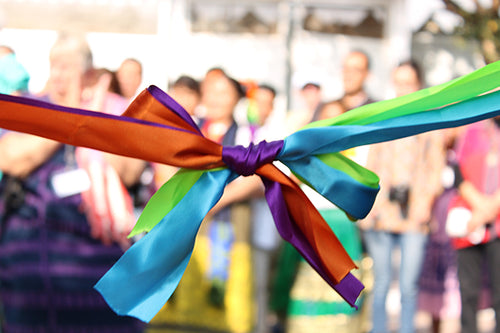
Juana Pacheco Pasaye, Cocucho, Michoacán
The large pots known as cocuchas are named for their place of origin. Cocucho is a remote Purépecha town in the state of Michoacán. These giants of the world of ceramics are basically coil pots, some measuring up to 1.50 mt. high and are made entirely by hand, without using wheels or moulds. Cocucho pots have been made for over 300 years. Their size, shape, and finish are determined by the art of the people who make them. Due to their dramatic impact, cocuchas are often used as focal points in gardens and entryways.
The Pacheco Pasayé family is from Cocucho and they have specialized in making the giant cocucha clay pots for multiple generations. The matriarch, Consuelo Pasayé Pascual, began learning from her mother-in-law at 12 years old after marrying 14-year-old Luis Pacheco Flores. They began by selling their wares from town to town, fiesta to fiesta on the backs of burros. They had nine children that have all followed in their footsteps and have received recognition for their work.
The true art to making these huge containers is in the"firing". After being shaped and finished, the pot sits on the fathoms of a wood fire and is covered with a tent. It is then left in the proper position for an hour or more, sometimes up to four hours. The next step is critical: the pot must be taken off the heat at the right time, or it will crack.
Two types of pots are made — black ones and red ones. The black finish is obtained by splashing or brushing a cornmeal solution over the pot immediately after it has begun firing. Red pots are made by smearing a layer of red clay before firing, allowing the pots to cool without adding other glazes or colors.
Juana is currently the president of a group of 30 artisans and she, too, has won The Galardón Nacional. She was also recognized in 2023 during easter week in Uruapan by state and national authorities for both her leadership and workmanship. The Pacheco Pasayé family are featured in Grandes Maestros de Arte Popular 20 Años published by Fomento Cultural.
Their craftmanship has expanded from traditional cocuchas to a variety of sizes, designs and towers of masterful creativity. These pots were originally used for storing water, seeds and grains. One large cocucha takes up to six people to form over multiple days. It’s fired in open air on their patio after drying for seven days.
Taller Familiar Pacheco Pasaye
Calle Independencia # 49
Cocucho, Michoacán
452 210 6035 WA; 452 179 3989 WA

